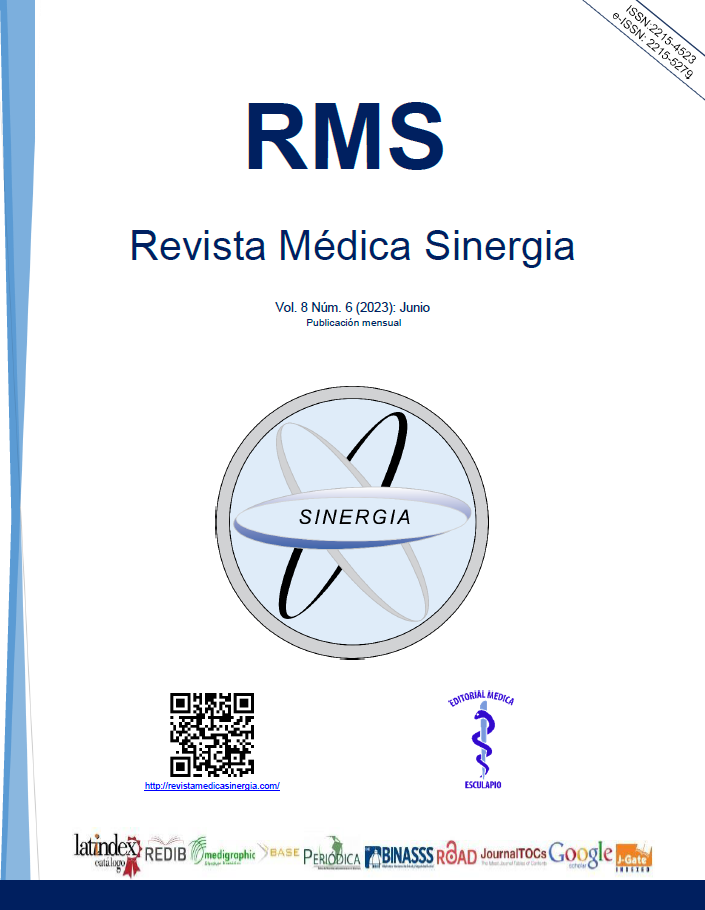Abstract
Hypertensive disorders of pregnancy, including preeclampsia, are one of the leading causes of maternal, fetal, and neonatal morbidity and mortality worldwide. In recent years, given the increase in the incidence of cardiovascular diseases in women of reproductive age and in the pediatric population, a series of studies have been conducted that have managed to capture the association between a history of preeclampsia and the development of cardiovascular diseases in women and fetuses years after the event, thus changing the thought that the entity culminates at the moment in which the placental tissue is expelled. “Preeclampsia, future cardiovascular risk factor in mothers and offspring?”, it is established as a bibliographic review focused on this cardiovascular risk factor and the impact it generates on the quality of life not only in women with a history of the disease, but also in their offspring; as well as the essential work that medical staff have to face in order to build effective therapeutic measures that manage to reduce or even mitigate the development of cardiovascular pathologies in these people.
Keywords
References
Rana S, Lemoine E, Granger JP, Karumanchi SA. Preeclampsia: Pathophysiology, Challenges, and Perspectives. Circ Res [Internet]. 2019 [citado 26 Feb 2023];124(7):1094-1112. Disponible en: https://doi.org/10.1161/CIRCRESAHA.118.313276
Fox R, Kitt J, Aye C, Lewandowski A. Preeclampsia: Risk Factors, Diagnosis, Management, and the Cardiovascular Impact on the Offspring. Journal of Clinical Medicine [Internet]. 2019 [citado 26 Feb 2023];8(10):1-22. Disponible en: https://doi.org/10.3390/jcm8101625
Modzelewski J, Siarkowska I, Pajurek-Dudek J, Feduniw S, Katarzyna MP, Baran A, et al. Atypical Preeclampsia before 20 Weeks of Gestation—A Systematic Review. International Journal of Molecular Sciences [Internet]. 2023 [citado 27 Feb 27 2023];24(4):1-14. Disponible en: https://doi.org/10.3390/ijms24043752
Turbeville H, Sasser J. Preeclampsia beyond pregnancy: long-term consequences for mother and child. Am J Physiol Renal Physiol [Internet]. 2020 [citado 27 Feb 27 2023];18(6):F1315-F1326. Disponible en: https://doi.org/10.1152/ajprenal.00071.2020
Jung E, Romero R, Yeo L, Gomez-Lopez N, Chaemsaithong P, Jaovisidha A, et al. The etiology of preeclampsia. American Journal of Obstetrics & Gynecology [Internet]. 2022 [citado 01 Mar 2023]; 226(2S):S844-S866. Disponible en: https://doi.org/10.1161/CIRCRESAHA.118.313276
Ives C, Sinkey R, Rajapreyar I, Tita A, Oparil S. Preeclampsia—Pathophysiology and Clinical Presentations. Journal of the American College of Cardiology [Internet]. 2020 [citado 01 Mar 2023];76(14):1690-1702. Disponible en: https://doi.org/10.1161/CIRCRESAHA.118.313276
Brown M, Roberts L, Hoffman A, Henry A, Mangos G, O´Sullivan A, et al. Recognizing Cardiovascular Risk After Preeclampsia: The P4 Study. Journal of the American Heart Association [Internet]. 2020 [citado 01 Mar 2023];9(22):1-14. Disponible en: https://doi.org/10.1161/JAHA.120.018604
Cunningham M, LaMarca B. Risk of cardiovascular disease, end-stage renal disease, and stroke in postpartum women and their fetuses after a hypertensive pregnancy. Am J Physiol Regul Integr Comp Physiol [Internet]. 2018 [citado 03 Mar 2023];315(3):R521-R528. Disponible en: https://doi.org/10.1152/ajpregu.00218.2017
Murphy M, Benton S, Cox B, Nerenberg K, McComb S, Krishnan L, et al. Maternal Immune Cell and Cytokine Profiles to Predict Cardiovascular Risk Six Months after Preeclampsia. Journal of Clinical Medicine [Internet]. 2022 [citado 05 Mar 2023]; 11(14):1.13. Disponible en: https://doi.org/10.3390/jcm11144185
Langlois A, Park A, Lentz E, Ray J. Preeclampsia Brings the Risk of Premature Cardiovascular Disease in Women Closer to That of Men. Canadian Journal of Cardiology [Internet]. 2020 [citado 05 Mar 2023];36(1):60-68. Disponible en: https://doi.org/10.1016/j.cjca.2019.06.028
Kuo YL, Chan TF, Wu CY, Ker CR, Tu HP. Preeclampsia-eclampsia and future cardiovascular risk among women in Taiwan. Taiwanese Journal of Obstetrics & Gynecology [Internet]. 2018 [citado 05 Mar 2023]; 57(3):364-369. Disponible en: https://doi.org/10.1016/j.tjog.2018.04.035
Kwiatkowska E, Stefariska K, Zielinski M, Sakowska J, Jankowiak M, Trzonkowski P, et al. Podocytes—The Most Vulnerable Renal Cells in Preeclampsia. International Journal of Molecular Sciences [Internet]. 2020 [citado 08 Mar 2023];21(14):1-11. Disponible en: https://doi.org/10.3390/ijms21145051
Melchiorre KTB, Giorgione V, Ridder A, Memmo A, Khalil A. Hypertensive Disorders of Pregnancy and Future Cardiovascular Health. Journal Frontiers in Cardiovascular Medicine [Internet]. 2020 [citado 08 Mar 2023];7(59):1-16. Disponible en: https://doi.org/10.1152/ajpregu.00218.2017
Wang W, Lin R, Yang L, Wang Y, Mao B, Xu X, et al. Meta-Analysis of Cardiovascular Risk Factors in Offspring of Preeclampsia Pregnancies. Diagnostics (Basel) [Internet]. 2023 [citado 08 Mar 2023]; 13(4):1-16. Disponible en: https://doi.org/10.3390/diagnostics13040812
Wojczakowski W, Kimber-Trojnar Z, Dziwisz F, Slodzinska M, Slodzinski H, Leszczynska-Gorzelak B. Preeclampsia and Cardiovascular Risk for Offspring. Journal of Clinical Medicine [Internet]. 2021 [citado 09 Mar 2023]; 10(14):1-17. Disponible en: https://doi.org/10.3390/jcm10143154
Karatza A, Dimitriou G. Preeclampsia Emerging as a Novel Risk Factor for Cardiovascular Disease in the Offspring. Curr Pediatr Rev [Internet]. 2019 [citado 12 Mar 2023]; 16(3):194-199. Disponible en: https://doi.org/10.2174/1573396316666191224092405
Figo.org [Internet]. The Norwegian Society for Gynecology and Obstetrics: Hypertensive Disorders of Pregnancy and Eclampsia in Norwegian. 2020 [citado 12 Mar 2023]. Disponible en: https://www.legeforeningen.no/contentassets/9daced7a6cbe4e458e313dc89ac63953/pasientinfo_engelsk_preeklampsi.pdf

This work is licensed under a Creative Commons Attribution-NonCommercial 4.0 International License.
Copyright (c) 2023 Array


